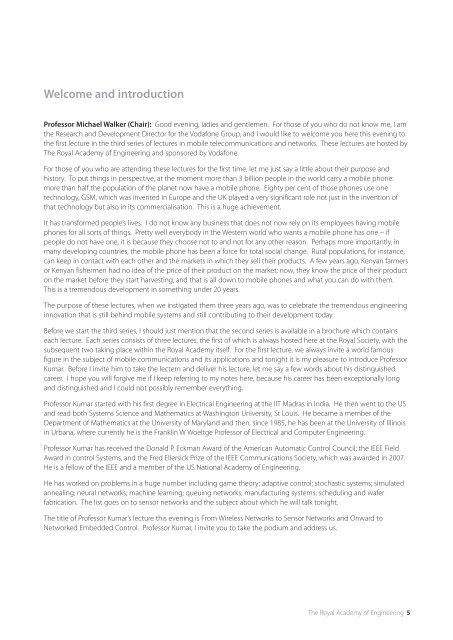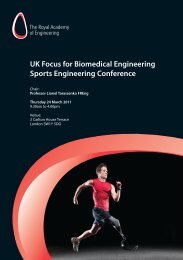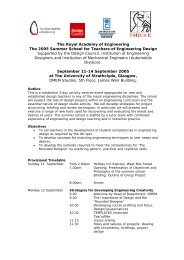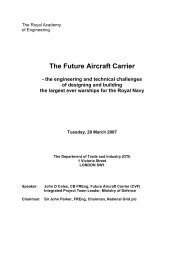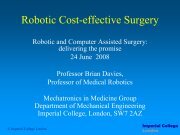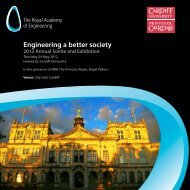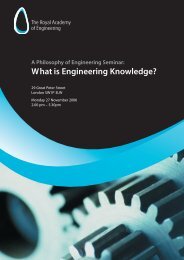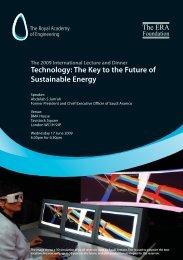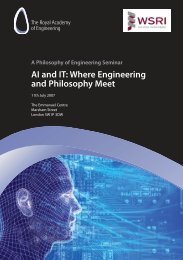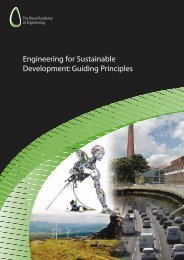Lecture Series in Mobile Telecommunications and Networks (1583KB)
Lecture Series in Mobile Telecommunications and Networks (1583KB)
Lecture Series in Mobile Telecommunications and Networks (1583KB)
Create successful ePaper yourself
Turn your PDF publications into a flip-book with our unique Google optimized e-Paper software.
Welcome <strong>and</strong> <strong>in</strong>troduction<br />
Professor Michael Walker (Chair): Good even<strong>in</strong>g, ladies <strong>and</strong> gentlemen. For those of you who do not know me, I am<br />
the Research <strong>and</strong> Development Director for the Vodafone Group, <strong>and</strong> I would like to welcome you here this even<strong>in</strong>g to<br />
the first lecture <strong>in</strong> the third series of lectures <strong>in</strong> mobile telecommunications <strong>and</strong> networks. These lectures are hosted by<br />
The Royal Academy of Eng<strong>in</strong>eer<strong>in</strong>g <strong>and</strong> sponsored by Vodafone.<br />
For those of you who are attend<strong>in</strong>g these lectures for the first time, let me just say a little about their purpose <strong>and</strong><br />
history. To put th<strong>in</strong>gs <strong>in</strong> perspective, at the moment more than 3 billion people <strong>in</strong> the world carry a mobile phone:<br />
more than half the population of the planet now have a mobile phone. Eighty per cent of those phones use one<br />
technology, GSM, which was <strong>in</strong>vented <strong>in</strong> Europe <strong>and</strong> the UK played a very significant role not just <strong>in</strong> the <strong>in</strong>vention of<br />
that technology but also <strong>in</strong> its commercialisation. This is a huge achievement.<br />
It has transformed people’s lives. I do not know any bus<strong>in</strong>ess that does not now rely on its employees hav<strong>in</strong>g mobile<br />
phones for all sorts of th<strong>in</strong>gs. Pretty well everybody <strong>in</strong> the Western world who wants a mobile phone has one – if<br />
people do not have one, it is because they choose not to <strong>and</strong> not for any other reason. Perhaps more importantly, <strong>in</strong><br />
many develop<strong>in</strong>g countries, the mobile phone has been a force for total social change. Rural populations, for <strong>in</strong>stance,<br />
can keep <strong>in</strong> contact with each other <strong>and</strong> the markets <strong>in</strong> which they sell their products. A few years ago, Kenyan farmers<br />
or Kenyan fishermen had no idea of the price of their product on the market: now, they know the price of their product<br />
on the market before they start harvest<strong>in</strong>g, <strong>and</strong> that is all down to mobile phones <strong>and</strong> what you can do with them.<br />
This is a tremendous development <strong>in</strong> someth<strong>in</strong>g under 20 years.<br />
The purpose of these lectures, when we <strong>in</strong>stigated them three years ago, was to celebrate the tremendous eng<strong>in</strong>eer<strong>in</strong>g<br />
<strong>in</strong>novation that is still beh<strong>in</strong>d mobile systems <strong>and</strong> still contribut<strong>in</strong>g to their development today.<br />
Before we start the third series, I should just mention that the second series is available <strong>in</strong> a brochure which conta<strong>in</strong>s<br />
each lecture. Each series consists of three lectures, the first of which is always hosted here at the Royal Society, with the<br />
subsequent two tak<strong>in</strong>g place with<strong>in</strong> the Royal Academy itself. For the first lecture, we always <strong>in</strong>vite a world famous<br />
figure <strong>in</strong> the subject of mobile communications <strong>and</strong> its applications <strong>and</strong> tonight it is my pleasure to <strong>in</strong>troduce Professor<br />
Kumar. Before I <strong>in</strong>vite him to take the lectern <strong>and</strong> deliver his lecture, let me say a few words about his dist<strong>in</strong>guished<br />
career. I hope you will forgive me if I keep referr<strong>in</strong>g to my notes here, because his career has been exceptionally long<br />
<strong>and</strong> dist<strong>in</strong>guished <strong>and</strong> I could not possibly remember everyth<strong>in</strong>g.<br />
Professor Kumar started with his first degree <strong>in</strong> Electrical Eng<strong>in</strong>eer<strong>in</strong>g at the IIT Madras <strong>in</strong> India. He then went to the US<br />
<strong>and</strong> read both Systems Science <strong>and</strong> Mathematics at Wash<strong>in</strong>gton University, St Louis. He became a member of the<br />
Department of Mathematics at the University of Maryl<strong>and</strong> <strong>and</strong> then, s<strong>in</strong>ce 1985, he has been at the University of Ill<strong>in</strong>ois<br />
<strong>in</strong> Urbana, where currently he is the Frankl<strong>in</strong> W Woeltge Professor of Electrical <strong>and</strong> Computer Eng<strong>in</strong>eer<strong>in</strong>g.<br />
Professor Kumar has received the Donald P. Eckman Award of the American Automatic Control Council; the IEEE Field<br />
Award <strong>in</strong> control Systems, <strong>and</strong> the Fred Ellersick Prize of the IEEE Communications Society, which was awarded <strong>in</strong> 2007.<br />
He is a fellow of the IEEE <strong>and</strong> a member of the US National Academy of Eng<strong>in</strong>eer<strong>in</strong>g.<br />
He has worked on problems <strong>in</strong> a huge number <strong>in</strong>clud<strong>in</strong>g game theory; adaptive control; stochastic systems; simulated<br />
anneal<strong>in</strong>g; neural networks; mach<strong>in</strong>e learn<strong>in</strong>g; queu<strong>in</strong>g networks; manufactur<strong>in</strong>g systems; schedul<strong>in</strong>g <strong>and</strong> wafer<br />
fabrication. The list goes on to sensor networks <strong>and</strong> the subject about which he will talk tonight.<br />
The title of Professor Kumar’s lecture this even<strong>in</strong>g is From Wireless <strong>Networks</strong> to Sensor <strong>Networks</strong> <strong>and</strong> Onward to<br />
Networked Embedded Control. Professor Kumar, I <strong>in</strong>vite you to take the podium <strong>and</strong> address us.<br />
The Royal Academy of Eng<strong>in</strong>eer<strong>in</strong>g 5


